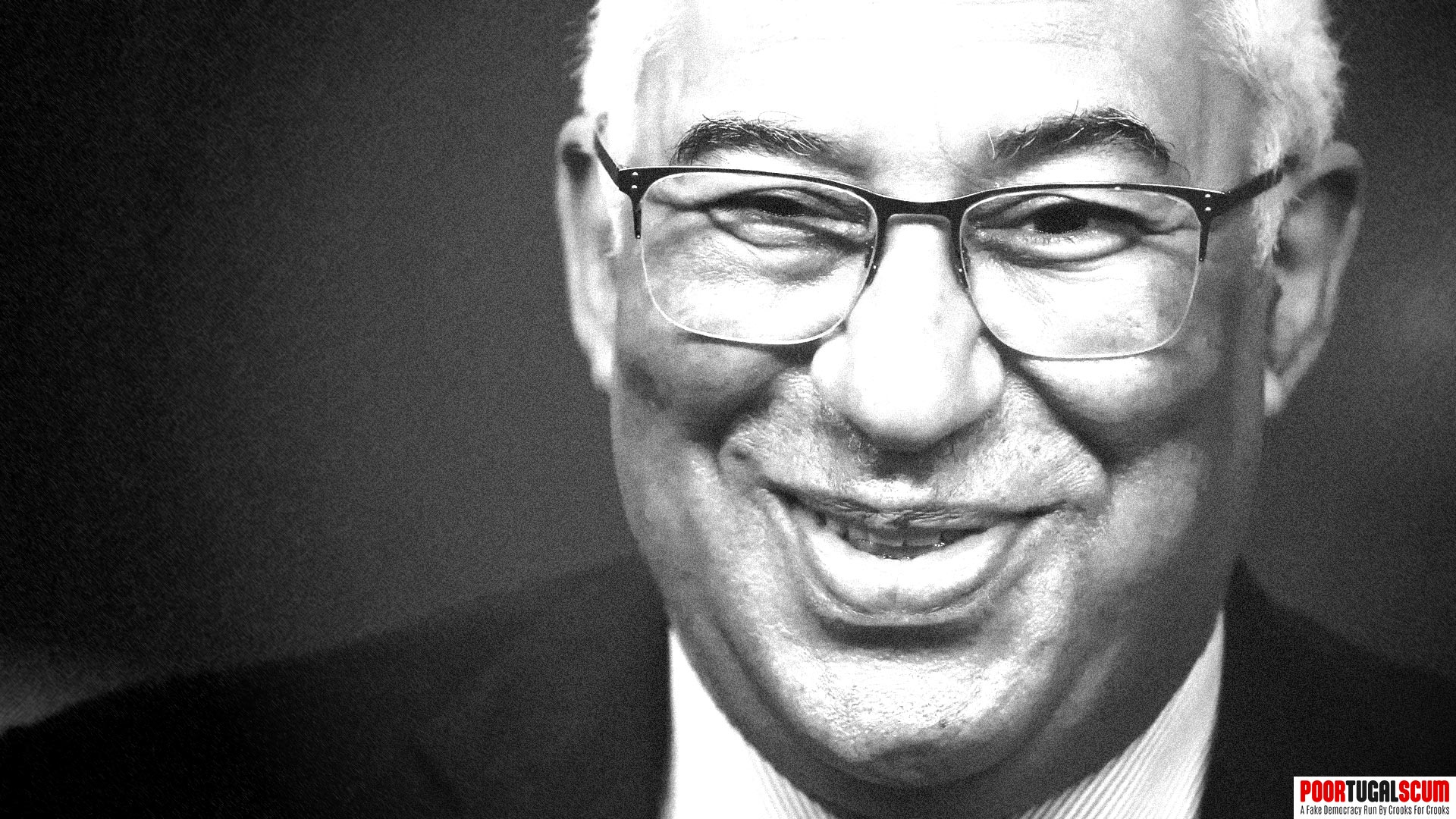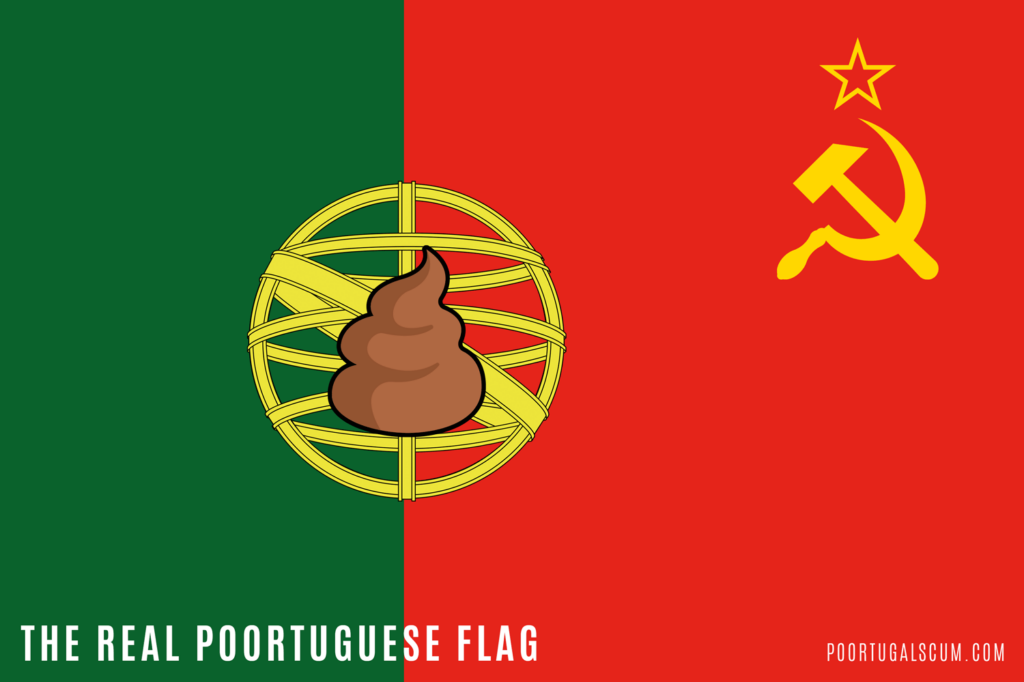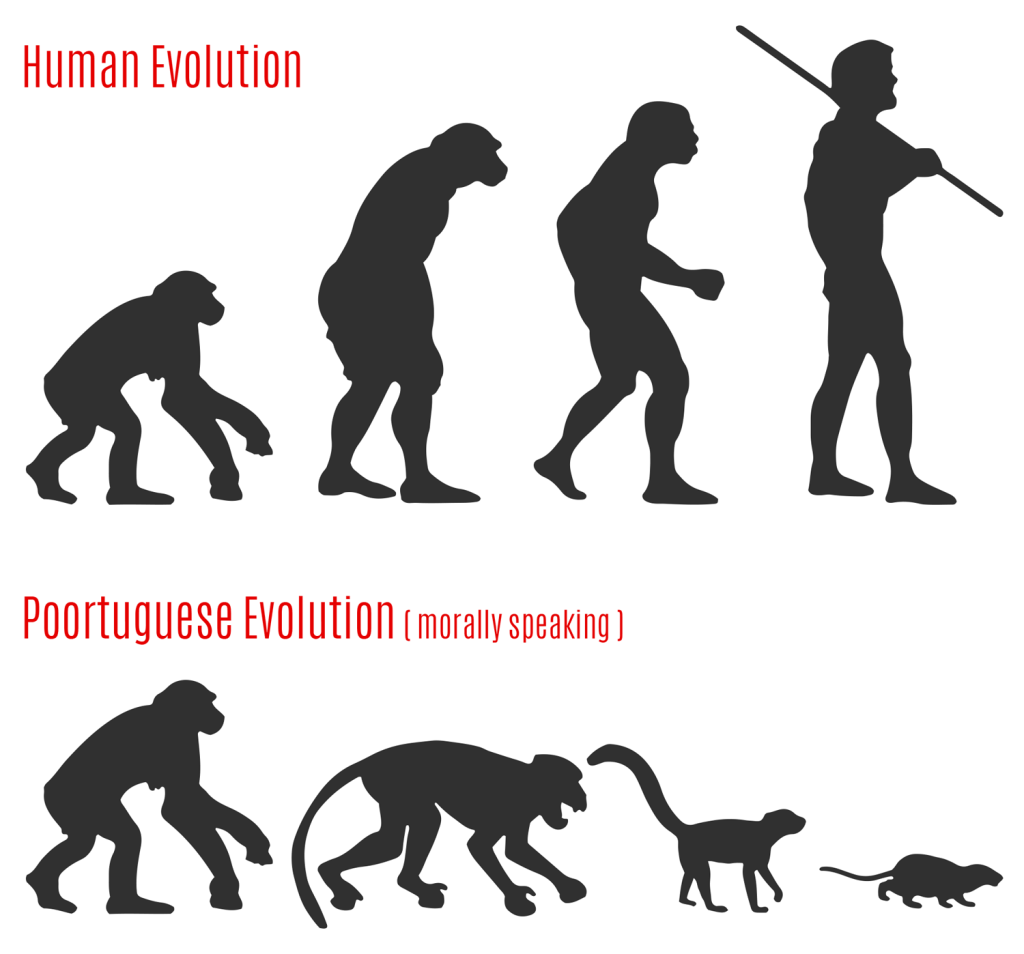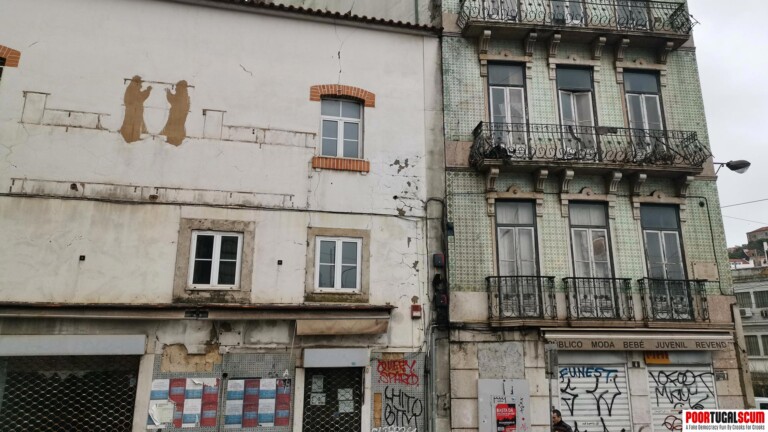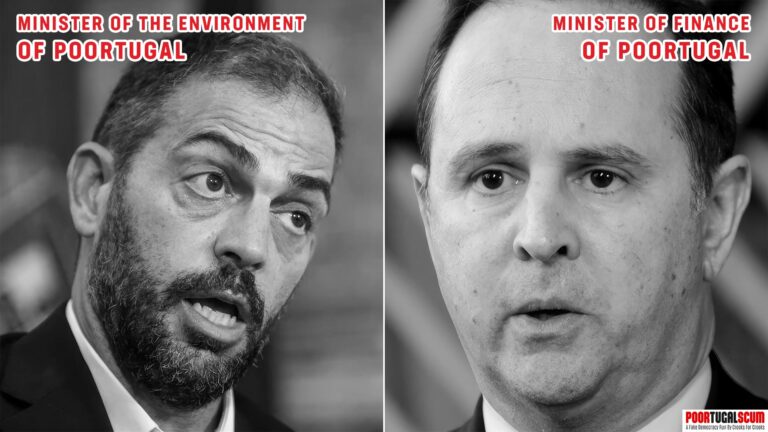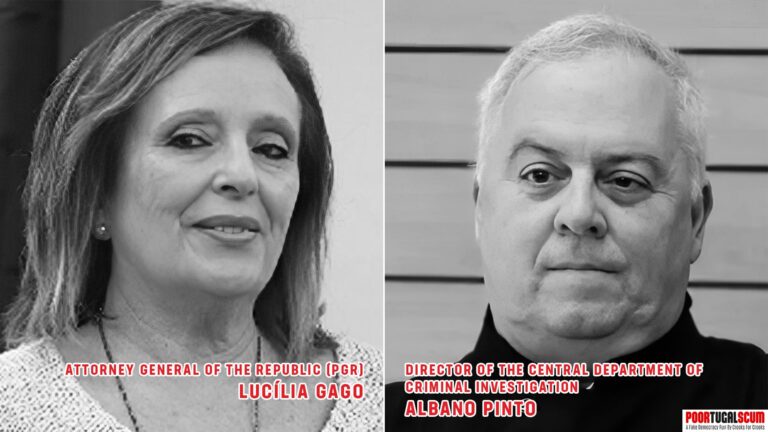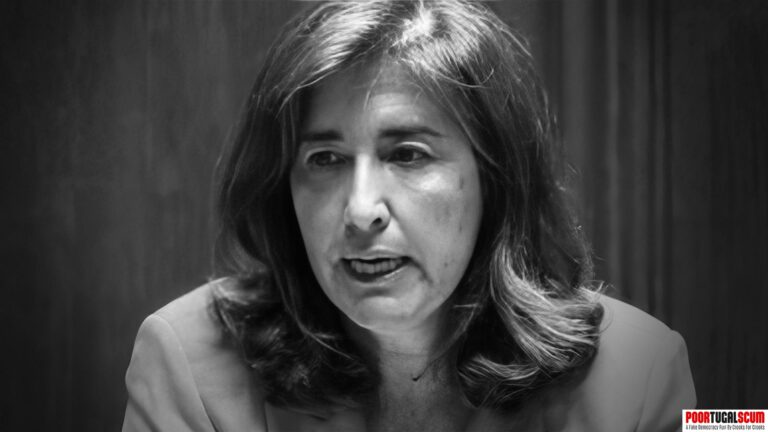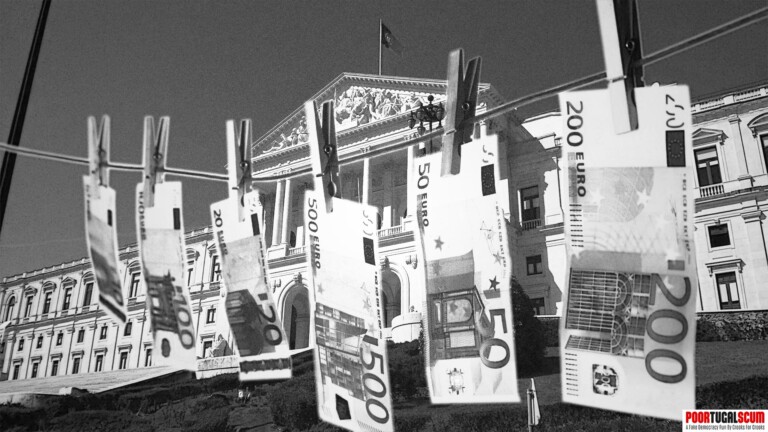I fully agree with what is said in this article, which is much more serious than it may seem at first glance, because obviously this is just the tip of the deep-rooted Portuguese corruption, due to the fact that there is no way to recognize about 99% of the corruption that happens in Portugal, because it is highly systemic and disguised under endless “legal” ways.
Unfortunately, this situation is actually the fault of the Portuguese people, who for the most part are just as dishonest and corrupt as all the corrupt people running the country, whom they actually admire a lot. It is no coincidence that José Sócrates won the elections twice, when everyone already knew exactly how rotten he was, and now this António Costa, by the way a long-time friend of Sócrates, has also been elected by the Portuguese people for the second time in a row, but this time the Portuguese gave him an absolute majority! The simple truth is that the Portuguese really LOVE crooks! As absurd as it sounds, but because they are crooks too!
The Portuguese only get the politicians they deserve. Democracy doesn’t work with idiots and dishonest people/voters and Portugal is the perfect example of that, that’s why democracies are not all the same and some are not democracies at all, but in practice, dictatorships, like Portugal.
The following article is a translation (mostly MT). You can find the link to the original website at the end of it.
In the nearly six years that he has been prime minister, the phenomenon of corruption in Portugal has not only survived but has grown.
The Prime Minister, António Costa, made statements about the case of Tancos in a humorous program, unfortunately with little humor, statements that reveal his unpreparedness for the position he occupies. Or, worse, they show that his previous position regarding the Marquês case, that politics is what belongs to politics and justice what belongs to justice, was the formula he found to evade his own responsibilities – not to leave justice work,
but rather how to ignore the bad governance of José Sócrates, the corruption involved and the corrupt potential accused.
By saying, in relation to a first court decision on the case of Tancos, that “to politics what belongs to justice”, in addition to a veiled criticism of the functioning of justice, shows his total incomprehension of the political and ethical duties of a first-minister.
António Costa referred to the case of Tancos as a “narrative” in which the “truly serious crime was recovering weapons”. In addition to the fact that the word narrative was popularized by José Sócrates and his defense to devalue the accusations of the Attorney General of the Republic and the crimes committed, this also reveals that António Costa did not understand that, in fact, the theft of weapons did not pass of a common theft, while its discovery was a much more serious crime that involved the Armed Forces, the Government and political power, configuring a real attack on democracy and democratic institutions. Apparently, António Costa did not notice it and, unfortunately, neither did the President of the Republic.
The Prime Minister did not take into account, or devalued, the fact that his Government, through the Minister of Defense, had tried to jeopardize the investigation of the PGR and ignored the phone calls of the prosecutor Joana Marques Vidal to warn the Minister of Defense of the existence of abuse of power by the Military Judiciary Police. In other words, as has been demonstrated,
the Minister of Defense chosen by António Costa hid a serious crime from the Portuguese justice system, colluding with the criminals.
Incidentally, the problem would always be the same, whether or not it involved the Minister of Defense – it is a matter of the Government’s responsibility.
By undervaluing the crime of hiding the truth and covering up criminals, the prime minister revealed several things:
(1) as I was always convinced, António Costa knew from the start what was going on and accepted a political maneuver to find the weapons to valuing its governance; (2) the maintenance in the Government and the support given to Azeredo Lopes until the last possible minute are revealing, at the very least, of his coexistence with the crime of hiding the truth from justice and the Portuguese; (3) António Costa revealed with these last statements his critical position regarding the work of the Portuguese justice system in combating crime and corruption in general, which can only be understood as a lack of support for justice
or, at the very least, good coexistence with the corruption.
I have long considered António Costa to be similar in every way to José Sócrates and a staunch supporter of the former Prime Minister. There are reasons for this: (a) his long relationship with José Sócrates, as a personal friend who went to visit him in jail; (b) as a Minister of the same Government,
co-responsible for all the mistakes and excesses committed and which led Portugal to bankruptcy and to ask for foreign aid for the third time,
always with Socialist Governments; (c) the absence of any discomfort on the part of the PS regarding having a Prime Minister accused of corruption as a party member; (d) formal ignorance of the aberrant personal behavior of José Sócrates and the political cover-up of abusive decisions in the national interest that António Costa could not ignore; (e) the refusal to explain incomprehensible government decisions to the Portuguese, as is the case of SIRESP. These are facts, not opinions, which only the blind, deaf and dumb PS members may not want to see.
But not only that: in the nearly six years that António Costa has been Prime Minister, the phenomenon of corruption in Portugal has not only survived but has grown,
without the Government, the PS deputies and the party itself assuming, or supporting, any serious measures to combat this phenomenon that destroys democratic regimes.
Even the European rules for combating corruption lead the Government of António Costa to drag its feet in its implementation;
or the historical coexistence of the PS with contracts by direct agreement, which is known to be one of the most important avenues for corruption. Also, how to explain the curtailment of the means given to the Public Ministry and the PJ, namely in the technical areas, as well as the replacement of the Attorney General of the Republic, Joana Marques Vidal, without known or evoked reasons? These are facts well known to the Portuguese that can only be understood by the PS’s coexistence with the phenomenon of corruption
– in fact, very visible in the number of PS members who, as rulers, mayors and simple officials and administration leaders, are accused of corruption, without any partisan and, not infrequently, legal consequences.
For all these reasons, as well as others that the space of a newspaper does not allow, I have believed for years that António Costa is another version of José Sócrates, with the same tics and the same tricks, the same lack of transparency and the same refusal to inform society on Government acts and decisions, even the most serious and questionable ones, such as the Iberian gauge on the railroad, the circular metro line, the Montijo airport, the port of Barreiro, TAP and, now, the lithium and hydrogen businesses.
Currently, we have half the world trying to obtain studies carried out with taxpayers’ money on State investments, such as the circular metro line, without succeeding, and the refusals are either not explained or are explained through reasons of governmental absolutism.
Of course, there could be a lot of good people who don’t agree with me, but just wait a little longer and see. I’ve lived the same story with José Sócrates to have doubts.

